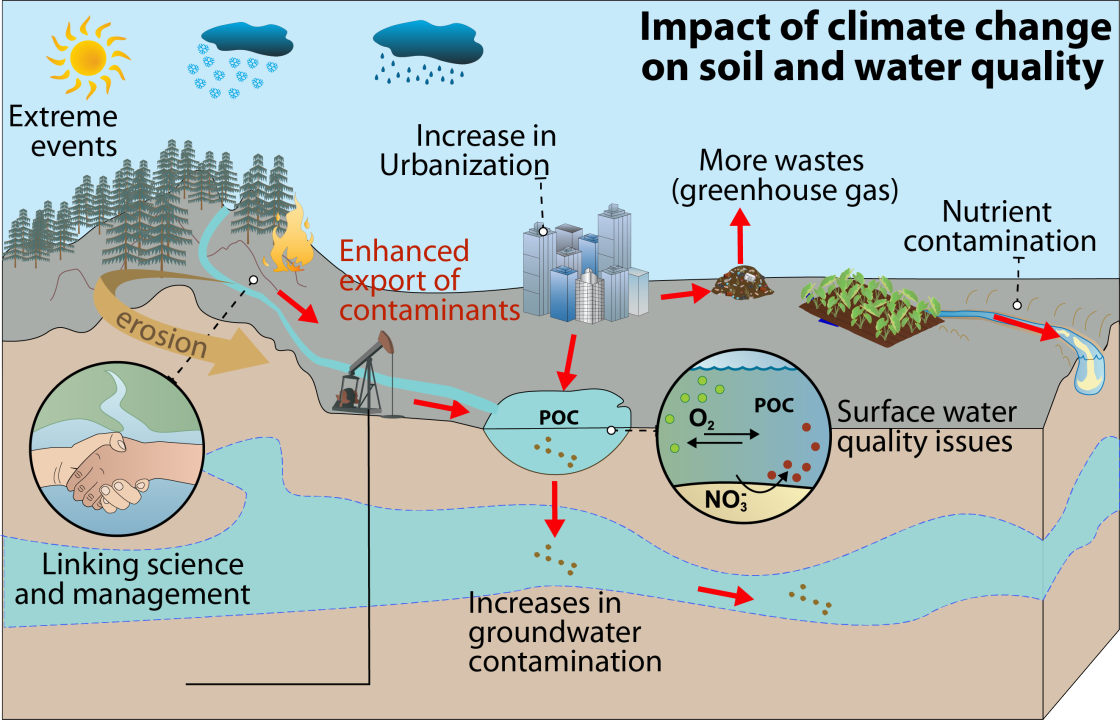
26
Feb
Climate Change and Its Impact on Biodiversity, Air Quality, and Soil and Water Degradation
The global climate crisis has far-reaching implications that include biodiversity loss, worsening air quality, and increasing soil and water degradation. This report provides an analysis of these impacts based on the available data and recent studies.
Impact on Biodiversity
Climate change has a profound effect on biodiversity, leading to shifts in species distributions, altered timings of biological events, and changes in ecosystem structure. For example, climate change is causing stress to coral reefs, resulting in significant losses in marine species that rely on them. Up to 50% of reefs are already degraded due to climate change, overfishing, and pollution ^1^. Wildlife behavior is also changing in response to climate change, with some species such as Arctic calves being born earlier in Spring and birds nesting earlier than usual ^2^. Additionally, some plant species are relocating uphill or poleward due to fluctuating water availability, changing temperatures, and extreme weather^3^.
A study by scientists at Trinity College Dublin and Hokkaido University found that preserving biodiversity can help mitigate the effects of climate change on ecosystems^4^. The team found that predators play a key role in maintaining biodiversity during heatwaves.
Impact on Air Quality
Climate change is exacerbating air quality problems by increasing the frequency and intensity of wildfires globally. This contributes to the release of pollutants into the atmosphere. Land degradation processes like deforestation contribute to climate change by releasing stored carbon ^5^. Deforestation has a climatic impact through both radiative and non-radiative processes^6^.
Impact on Soil and Water Degradation
Climate change is contributing to increased rates of soil erosion and degradation. Half of the topsoil on the planet has been lost in the last 150 years due to unsustainable agriculture practices, deforestation, overgrazing, and use of agrochemicals^7^. In addition to this, land use changes have resulted in increased flooding due to land conversion that is less able to absorb water^8^.
Water degradation is also a significant concern. Climate change has led to modified water regimes and increased salinity in wetlands^9^. Coastal flooding frequency is projected to double within decades due to sea-level rise^10^.
Solutions
Restoration and sustainable land management practices can improve land degradation and provide socio-economic gains including $140 trillion per year and potential for renewable energy and job growth ^11^. Nature-based solutions can contribute 20-37% to keeping temperature increases below 2°C^12^. These include rainforest recovery, peatland protection, kelp forest restoration, green roofs, native tree planting alongside rivers.
Furthermore, an integrated ecosystem management approach could deliver multiple ecosystem services more effectively^13^. An ecosystem services framework would help regulators, policymakers, and ecosystem managers develop coherent management strategies.
In conclusion, addressing climate change requires comprehensive strategies that not only reduce greenhouse gas emissions but also conserve biodiversity and improve soil, water, and air quality. Such holistic approaches will yield multiple benefits for ecosystems as well as human societies.
💼💡 Are you ready to make a positive impact and be part of the solution? Subscribe to the Sustainable Investing Digest for actionable insights on how to support sustainable practices. 📚💡 Subscribe on LinkedIn https://www.linkedin.com/build-relation/newsletter-follow?entityUrn=7053058780464345088
#SustainabilityMatters #ClimateActionNow #ProtectOurPlanet #ActForNature #SubscribeForChange 🌍🌿